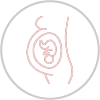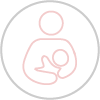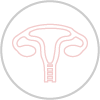The pelvis is made up of a number of bones forming two main joints – the sacroiliac joints (SIJ) at the back, and the pubic symphysis joint at the front. PGP is the term used to describe the pain experienced in the front and back of your pelvis and many women experience some degree of pelvic girdle pain post pregnancy (the common areas of pain are shown on the diagram above in red).
A number of changes during pregnancy and post delivery may cause pain in the pelvic girdle, including hormones, altered posture, weakened muscles, poor positioning, repetitive movements, or trauma. The joints can move asymmetrically and unevenly, causing pain. Muscles of the pelvis, lower back and legs attempt to compensate for this increased movement, and often develop tightness and pain. Some muscles such as your abdominals and pelvic floor, may also be weakened and inhibited, thus causing altered function. Previous trauma that has damaged the pelvis, or a fall, before or during pregnancy can also make you more at risk of developing PGP. Some women may develop PGP post delivery, despite not suffering with it during the pregnancy. This can be due to type and method of delivery, use of stirrups, McRobert’s manoeuvre for shoulder dystocia and sustained positions of labour and then feeding.
Back pain is extremely common, and incorporates neck (cervical) pain, mid back (thoracic) pain, and lower back (lumbar) pain. It can range from mild acute pain associated with certain and specific activities, or it can be pain that becomes chronic and doesn’t go away. Previous episodes of back pain may put a woman at higher risk of developing back pain.
Pregnancy weakens the ligaments and muscles that help keep the joints together and moving soundly. If those weakened ligaments become overloaded or injured, it results in pelvic / back instability and pain around the joints which can be brief, or last for years after the birth.
In those first busy days and months as a new mum, it is common to forget about your own needs for a while.You’re exhausted, sleep deprived, anxious and well…..just so busy! It is easy to spend days and nights sat in the same position feeding, or pacing the floors for hours holding a screaming baby (that only gets heavier and heavier!!). You contort yourself into awkward positions to keep a sleeping baby asleep, constantly lifting your infant in and out of car seats / cots / on & off the floor etc. When you’re tired and dazed, it’s easy to cut corners, forget about your posture, utilise poor manual handling techniques…..and then you wonder why a few months down the line you’re really struggling with pelvic or back pain!
It’s so important you address these concerns before they become chronic in nature, and bother you for longer than they need to. After all, your baby grows into toddler and into a pre-schooler – they get heavier and more demands are placed on your body as a result.
Physiotherapy for PGP and Back Pain:
- Full assessment of pelvis, spine, arms and legs: Assessment of Joints, ligaments, muscles, nerves
- Posture assessment: sitting, standing, walking
- Manual therapy as indicated (joint mobilisation/manipulation, soft tissue massage & release, myofascial release, stretching)
- Teach stability exercises: pilates, strength, stretching
- Lifestyle assessment: lifting, carrying, work, daily activities, sleeping, positioning
- Pain management and other therapeutic options
- Acupuncture
- Back supports as indicated
- Advice for return to exercise, running, gym classes, gym based exercise



